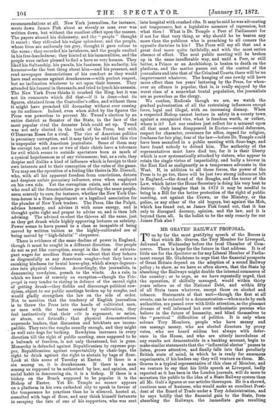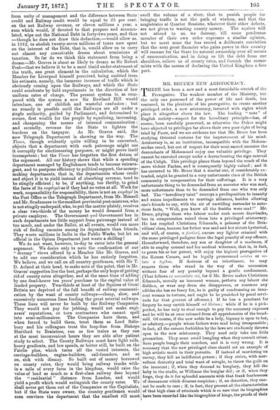MR GRAVES' RAILWAY PROPOSAL.
TO us by far the most gratifying speech of the Recess is that which Mr. Graves, the Tory Member for Liverpool, delivered on Wednesday before the local Chamber of Com- merce. There is hope for the future in that address. It is of little use for the Spectator or for any Liberal Member of Parlia- ment except Mr. Gladstone to urge that the financial prospects of Great Britain depend on the adoption of a sound Railway policy ; to show, as we have so often shown, that the State by absorbing the Railways might double the internal commerce of the country ; or to urge, as we have repeatedly urged, that the operation, if skilfully managed, would within thirty years relieve us of the National Debt, and within fifty of all State taxes whatever, except those on alcohol and tobacco. Statements of that sort—though the first at all events, can be reduced to a demonstration—when made by such authorities, are passed over with little attention, as the pleasant dreams of well informed but over enthusiastic persons who believe in the future of humanity, and blind themselves to the " practical " difficulties of politics. It is only when solemn Tory Members, people who have money and can manage money, who are elected directors by proxy votes, who are heard seldom but always with defer- ence in the House, and who are utterly incredulous of any results not demonstrable in a banking account, begin to make similar statements that the "influential elector" pauses to listen, grows attentive, and finally falls into that peculiarly British state of mind, in which he is ready for enormous experiments, if his leaders say they will venture on them. Mr. Graves is a typical representative of this class of Member, and we venture to say that his little speech at Liverpool, badly reported as it has been in the London journals, will do more to accustom the public to the idea of a State Railway system than all Mr. Galt's figures or our articles thereupon. He is a shrewd, cautious man of business, who would make an excellent Presi- dent of the Board of Trade under a Tory Administration, and he says boldly that the financial gain to the State, from absorbing the Railways, the immediate gain resulting
from unity of management and the difference between State credit and Railway credit would be equal to 25 per cent. on the net Railway revenue, or eleven millions a year, a sum which would, if devoted to that purpose and accumu- lated, wipe out the National Debt in forty-two years, and thus —though he does not draw this deduction,—would allow us, in 1912, to abolish twenty-seven millions of taxes now spent on the interest of the Debt, that is, would allow us to carry out almost any conceivable dream about remissions of taxation. So far do we think this statement from being a dream—Mr. Graves is about as likely to dream as Sir Robert Peel—that we believe it to be a most timid under-statement of the truth, one great element in the calculation, which the Member for Liverpool himself perceived, being omitted from his estimate, namely, the immense increase of traffic which is obviously coming upon the Railways, and which the State could accelerate by bold experiments in the direction of low uniform rates of charge. The present system is, as com- pared with the system a new Sir Rowland Hill would introduce, one of childish and wasteful confusion ; but no remedy is possible until the Railways are all under a single authority, guided by Parliament, and determined to secure, first wealth for the people by equalizing, increasing, and cheapening the means of internal communication ; and secondly, revenue for the State to lighten the burdens on the taxpayer. As Mr. Graves said, the new Telegraph Department is showing us the way. The Times, though evidently quite willing to be converted, objects that a department with such patronage might use it corruptly for electioneering purposes, or might prove itself incompetent ; but the Times has forgotten the first datum of the argument. All our history shows that while a spending department managed by Englishmen tends to become extrava- gant, and to postpone efficiency to political support, the money- making departments, that is, the departments whose credit and object it is to yield instead of absorbing revenue, tend to be stingily efficient ; to be, if anything, too thrifty, to grind the faces of its employes as if they had no votes at all. Work for work, responsibility for responsibility, there is not an employe in the Post Office or the Telegraph Department, from Mr. Monsell and Mr. Scudamore to the smallest provincial post-mistress, who is not stingily underpaid, who, to put the matter plainly, receives a clear two-thirds of the money he would demand from a private employer. The Government qua Government has in such departments too little support from patronage instead of too much, and under the Ballot, at all events, would run more risk of finding enemies among its dependants than friends. They waste millions in India in the Public Works, but let an official in the Opium Department just waste a shilling !
We do not want, however, to-day to enter into the general argument. We desire only to note the confirmation of our " dreamy " views offered by a Member like Mr. Graves, and to add one consideration which he has entirely forgotten. We believe, and we call on all country gentlemen, with Sir T. D. Acland at their head, to make note of the point, that in Mr. Graves' suggestion lies the best, perhaps the only hope of getting rid of county rates altogether, and at the same time of adding by one dead-heave ten years' purchase to the capital value of landed property. Two-thirds at least of the Squires of Great Britain are deprived of the full benefit of railway communi- cation by the want of county railways—cheap, slow, and excessively numerous lines feeding the great arterial railways. These lines will never be built by the Railway Companies. They would not pay for jobbing, would not make engi- neers' reputations, or turn contractors who cannot spell into semi-millionaires. The Companies hate them, and when forced to build them, treat them as Lord Salis- bury and his colleagues treat the loop-line from Bishops Stortford to Braintree, run as few trains as they can at the most inconvenient hours they are able after patient study to select. The County Railways must have light rails, heavy gradients, and low speeds, or better still, be built on the Fairlie plan, which turns all the vested interests, the carriage-builders, engine-builders, rail-founders, and so on, sick with dismay. So built out of money borrowed on county rates, they would bring railway trucks with- in a mile of every farm in the kingdom, would raise the value of land as much as a first-class railway does beyond the " residential " distance from London, and would yield a profit which would extinguish the county rates. We shall never get them out of the Companies or the Capitalists, but if the State were owner, the country gentlemen would soon convince the department that the smallest rill must
swell the volume of a river, that to pnnish people for bringing traffic is not the path of wisdom, and that the magistrates at Quarter Sessions, whatever their other defects, are not given to wasting county money. The squires will not attend to us, we daresay, till some ponderous member of their own order expresses a similar opinion, but we must none the less record a deliberate conviction that the next great financier who gains power in this country will resume for the State its natural ownership over all means of communication, and in doing so lift the debt from our shoulders, relieve us of county rates, and furnish the econo- mists with the means of declaring the United Kingdom a free port.



































 Previous page
Previous page